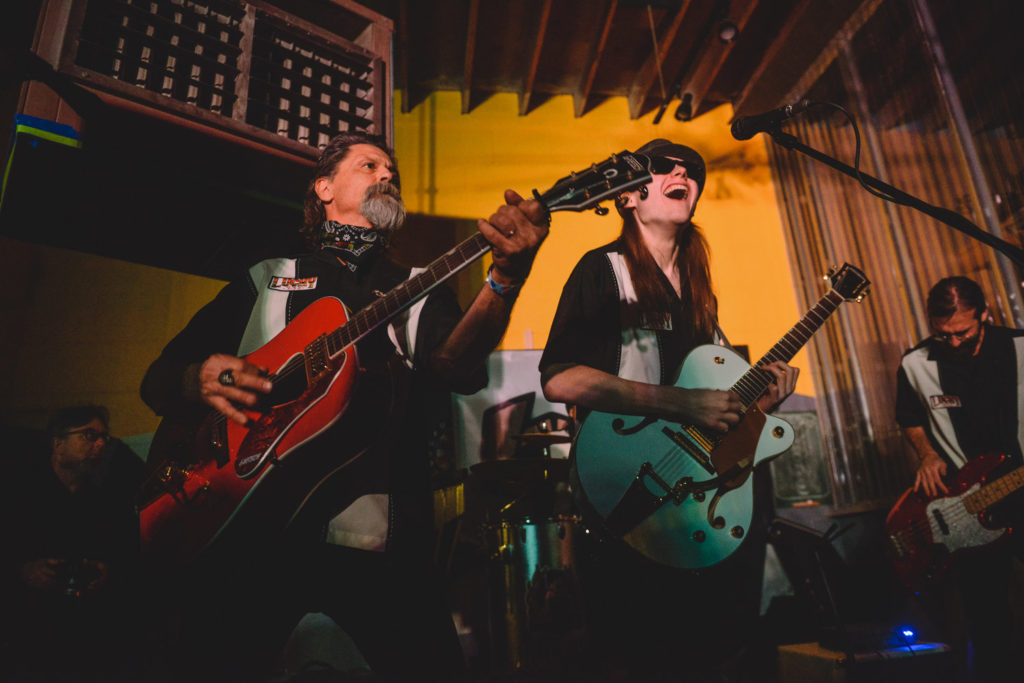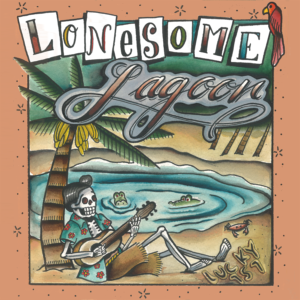
Lucky 757 Interview
7/23/2018, By: J.G. Bennet – Lucky 757 is rockabilly and surf rock band from Portsmouth, VA. They started in 2014 and released their third album, Lonesome Lagoon, on 7/20/2018. The album will be released on Scad Records. Lead guitarist, Corey Spivey, wielding a huge Gretsch hollow body guitar, alongside his dad and stalwart bandmates, is on a crusade to keep the sounds of surf rock alive. It’s working. Receiving international airplay, Lucky 757 continues to develop a unique sound and pay homage to great surf rock musicians from it’s halcyon days of longboards, go-go dancers in bikinis and, of course, tons of reverb on the guitars.
JG: So, Corey, is there a lot of surfing in out in Virginia?
Corey: (Laughs) Well, no, but in Virginia Bech you’ve the got the East Coast surfing championships, and a couple of us in the band surf.
JG: What is it about surf rock that makes the music so steadfast? It’s lasted so long, yet it still finds news fans and is still relevant some 80 years later. Why, in your opinion, is this the case?
Corey: I think it’s because a lot of it is instrumental. So, it doesn’t matter where you are in the world, or what time it is, or what’s going on, or what language you speak. It’s all instrumental, so you can get your message across with the music. You say what you want to say with the guitars and all that. That speaks to people. Even if there isn’t any singing, it can mean different things to different people, and that is universal. People are just able to grasp on to that, and it never seems to get old.
JG: Surf rock generally has very strong, well defined, melodic statements, or “melodies” if you will. Even if there are no lyrics, you can still identify, “Oh, that’s the melody.”
Corey: YES! That was one of the hardest things to figure out about surf rock when it came to writing the songs. You can pick notes all day long, but to come up with a melody that’s memorable, and strong…. That’s the words!
JG: The lead guitar playing on Lonesome Lagoon is fantastic. Not to slight the rest of the band, but you’re the one up front playing these cool guitar melodies. Can you talk a little bit about how you developed your technique on guitar to perform these long, linear lines (melodies).
Corey: I wanted a clean, distinct, sound that wouldn’t get it the way of the music around it. I wanted every note that I played to stand out and be accounted for. That way you could create a melody that people could sing in their heads, and you add some reverb and a whammy bar… Like all good surf music needs! … and you’re pretty much there. If you’ve got everything right with the guitars, and the amps and the reverb, and your mind is in the right place, you can start to feel the whole “surf” thing. I’ve always listened to this music, my whole life. It has a very strong influence on me.
JG: So you learned how to play by ear or more traditional music classes, or a combination?
Corey: My dad taught me the basics of the guitar and some chords, but he doesn’t play lead guitar. I had to learn that by ear, listening to the records. When I was nine years old, I got a copy of The Ventures “Surfing” Album. It blew my mind! I had to learn every note of the that record. That record was pivotal in my development, and so was “The Best of Dick Dale”.
JG: Let’s drill down some of your unique techniques. You mentioned Dick Dale. One of his signature guitar techniques is the rapid fire tremolo picking (Editors note – Tremelo is the art of strumming one note as fast as humanly possible.) Yet, on Lonesome Lagoon, you don’t really do that. Why the departure from that particular technique?
Corey: Right. I wanted to create a unique voice for our band, but still pay tribute to Dick Dale and those legends. So, I went with a more linear, sustained type of approach. I liked the way it sounded when I held the notes out longer and created a sustained kind of thing. You know, I play a hollow body guitar, and that gives me a lot more natural feedback. With that much sustaining power, it gave me reasons to not have to do the whole “tremolo picking” thing. It also gives the melodies a singing quality to them.
JG: By the way, with a doubt, Dick Dale is the loudest guitar player I have ever seen live! Metallica (James Hetfeild), Pantera (Dimebag), ZZ Top (Billy Gibbons), Dream Theater (John Petrucci)… didn’t ever come close. Dick Dale was BY FAR the loudest guitarist of all of them.
Corey: (Laughs) Yeah! He’s the king of that! He’s the Godfather! Dick Dale created “LOUD”. Way before any metal bad was doing it, he was doing it.
JG: Getting back to your guitar techniques, you employ some very smooth double stop bends (Note: bending two or more guitar strings in unison on the guitar simulatainosly). It’s kind of a dying art. There aren’t a whole lot of modern guitar players who focus on this old school guitar skill. How did you develop this technique?
Corey: That came a lot from the Rockabilly and Country side of things. Players like Don Rich, James Burton, Cliff Gallup and The Ventures’ Nokie Edwards. I was influenced by these guitar players. I liked the sounds and the uniqueness of it, but it’s not something that you hear as much anymore and I wanted harken back to that sound. I wondered where it wen and why people don’t do it as much anymore. So, I tried to develop my style to be like that.
JG: Back in the day and I’m talking about the period from about 1970’s-early 2000’s, Guitar Mags were huge. That was where you went for all the information about guitar playing, from new tabs or what was happening with the scene. We devoured those to learn how to play guitar, but with Internet era firmly here now, what advice would you give to a young guitar player now, in the year 2018? How can they go about developing their musical chops and skills on guitar?
Corey: There is so much out there now, if you’re willing to do the research. For example, if you want to learn surf guitar, you need to look up and listen to some of the stuff you want to play. Im sure you can find TABS for that stuff, but mainly it’s developing your ear for the vocabulary of the style. Watch videos of the greats playing it and really STUDY the music. Put yourself deep into the music and take advice from other players that you respect. Try to emulate the great musicians who have been doing this for years. It’s a dying art.
 JG: Let’s get back to the new album, Lonesome Lagoon. What is the process that you as a band use to write and record the songs? Can you describe the workflow that you use in the studio to record?
JG: Let’s get back to the new album, Lonesome Lagoon. What is the process that you as a band use to write and record the songs? Can you describe the workflow that you use in the studio to record?
Corey: The actual title track, Lonesome Lagoon, we recorded 100% live, right off the floor in the studio. All of the songs were written before we went in to record. What we did for most of the album was to gather in the studio and play the song live together. Then we would go back after that and tidy things up. Sometimes we would only keep the drums, or other times we would keep everything, but the bass. Basically, we tried to do as much as we could live and kept overdubs just for “seasoning”. Certain things like the trumpet on Fernando or the sound effects on MONSTA!, we added later. Sometimes I’d double track guitars or record acoustic guitars separately so we didn’t have any bleed from the drum mics.
JG: So there wasn’t use of iso-booths? You guys weren’t in separate rooms with headphones on?
Corey: Nope. We were all facing each other in one room, gathered around our drummer, Angel. We did keep the amps a little further away from us and had headphones on to hear the mix, but we were all in the room together.
JG: Do you guys use click tracks to help record?
Corey: No, we don’t. We let our drummer Angel handle it. He’s the timekeeper, so he’s in charge of keeping us on the beat.
JG: Do you have a favorite track on the new record? One where, when you listen to it, you say, “Thats Lucky 757!”
Corey: Yes! Spanish Shore. It’s the first song on the album and the first single being released. But, it was actually the last song we wrote for the album. We were getting down to the wire and we needed one more song, and that one just kind of came out of nowhere. We recorded it in couple of days, and it was done! When we do play a live show it is usually our opener, because it sums up the whole sound of Lucky 757.
JG: What does Spanish Shore mean to you? Have you been to Spain? Is there a specific beach there you like to hang out at? …
Corey: No, I’ve never been to Spain, but there are some radio stations over there that play Lucky 757. One of them is Rock Therapy Radio, over in Spain. They were one of the first stations to play or music, and it happened only a few days after our music came out. I didn’t even submit any music to them, and then one day I got an email from them stating that they were going to start playing our music on air, and they did. So, we started writing some songs with them in mind. Spanish Shores was one and Mar Agitado was another. That means “rough seas” in Portuguese.
JG: One person that you’ve cited in your bio is the famous Italian film, “Spaghetti Western” composer, Ennio Morricone. He is a fantastic composer in his own right, and probably influenced more modern music than most people realize, and yet he just recently won his first Academy Award in 2016 for The Hateful Eight. Could you talk for moment about Mr. Morricone’s influence on you and pop music in general?
Corey: He created such a unique sound. Anytime you hear a low, reverbed-out, baritone guitar, that’s straight outta’ his book. Anytime you hear a really high pitched, Mariachi style trumpet; That’s Morricone. I find his style to be so unique and it set the tone for all those movies he did. That’s whaat our song Fernando was written for. It’s completely a dedication to him. We had our buddy Damian come in and play the trumpet and I played the classical guitar at the beginning of the track.
JG: What message would you like to share with the world?
Corey: I think everyone should support independent artists who make music like this, because it’s not dead. If you look around you’ll find people playing rockabilly, or surf, or Americana, or Bluegrass, and all these types of musics. Its time that these types of music shine again and people bring it back into the spotlight.
Other cool articles you’ll enjoy!



